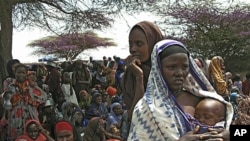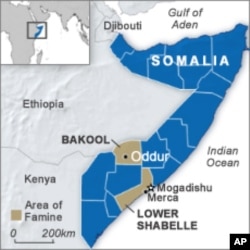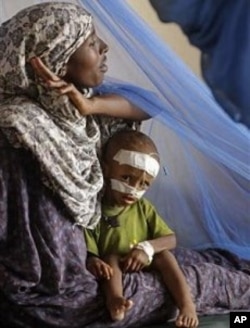The United Nations has urged “massive” action to save millions of people in the drought-stricken Horn of Africa region. One challenge for the international community is logistical – getting enough food to areas that need it as soon as possible.
“There are fairly good food stores in certain areas that can be brought to the scene immediately,” said David Shinn, former U.S. ambassador to Ethiopia and Burkina Faso. Shinn is currently an adjunct professor of International Affairs at the Elliot School of International Affairs at George Washington University in Washington, D.C.
“The problem is over the longer term where more food is going to be required than I think was originally envisaged,” he said. “It will be necessary to identify and transport to the region significantly larger quantities of food to ensure famine does not extend around the area. “
More challenging is getting food to areas of Somalia held by the Islamic militant group al-Shabab. According to the United Nations, the group controls more than 80 percent of southern areas where there are 500,000 malnourished children.
Al-Shabab has had a rocky rapport with aid agencies. Last year, it kicked out Western aid groups that refused to meet several demands, including a ban on women operating on the ground. Earlier this month, militants said they would allow groups to return to feed those affected by drought. Then, late last week, the group changed its mind, and denied there is famine in Somalia.
Going against policy
Another challenge is the U.S. policy that bans any type of material support to the rebels, including “taxes” imposed on relief agencies.
“There was a certain willingness by parts of the international community to ‘wink and nod’ if they felt the conditions by al-Shabab were not that onerous. The U.S. was less willing to do that. It has declared al-Shabab to be a terrorist organization and it has threatened the security of the U.S. So, [the U.S. government] did not want to be in a position of directly or indirectly supporting al-Shabab. It was taking the lead on this issue,” said Shinn.
Security is also an issue, though Shinn rejects introducing any U.N. or AU troops into the area, a move “which could create a bigger problem than the one that already exists there.”
The answer may lie in part with the rebels.
“The best solution,” said Shinn, “is to extract a commitment [from al-Shabab] that there are no conditions. In the interest of keeping Somalis alive, which would seem to be in their interest, too, [the rebels should allow] the international aid agencies and the NGOs to go in to feed Somalis and be left alone."
Shinn said a failure to allow humanitarian relief “makes them look bad as if they have no ability to control events in the territory they have seized.” He said it would also likely mean more Somali refugees heading for Dadaab and other camps in Kenya and Ethiopia.
Political will
Oxfam has accused the international community of “willful neglect” in its response to the famine. The aid and development group says the spreading drought and famine had been anticipated for months, but that donors are $800 million behind in their commitments to fight the drought.
But Shinn said the public doesn’t understand the logistics involved in moving large quantities of food on short notice through a long supply chain.
“It is very easy,” he said, “to sit back and pontificate about what’s required and when it’s required, but it’s not always easy to do that… and these are fairly fast-moving events. Even though this problem has been known for months, I don’t think the magnitude was known earlier on and the international community may have been caught off guard.”
On Monday, U.N. agencies pressed for $1.6 billion in aid for East Africa over the next year, with over a fourth of that to be delivered within three months.
Last week, U.S. Secretary of State Hillary Rodham Clinton announced an additional $28 million in humanitarian aid to Somalis suffering from hunger. That comes on top of $431 million in U.S. emergency assistance to the Horn this year.


